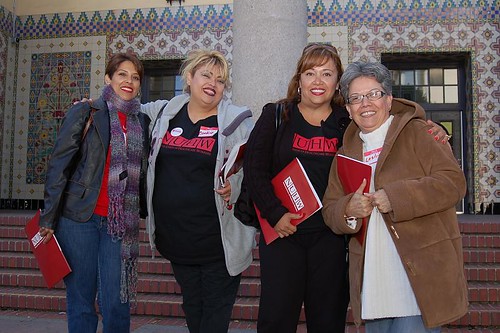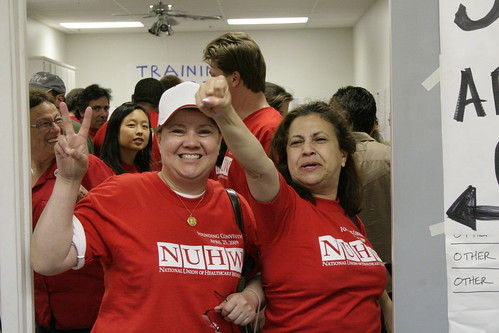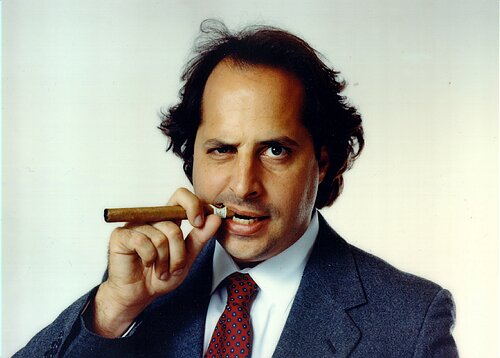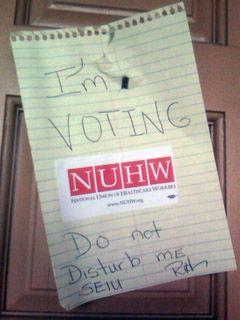
Hold on to your huevos, folks, because Sierra's going on a rant here...
At the beginning of the Great California Union Foodfight, the prior officials of UHW who broke off and formed NUHW were receiving material and much-appreciated support from the California Nurses Association. At that time, the CNA was embroiled in a years-long feud with SEIU over who was best to organize nurses around the country.
Well, back in late March, to the surprise of just about everybody in the labor world, and with no notice to NUHW whatsoever about what was going on, CNA and SEIU
came to a truce. Not much was written in the meantime about what the thought processes were inside CNA that would bring them to common cause with an organization that
bused in thugs to break up an appearance by their president, RoseAnn Demoro, in Dearborn, MI, back in April of 2008. (By the way, a shout-out goes to Chief SEIU Thug Dave Regan for that little piece of "union democracy in action")
The folks at
Labor Notes evidently still have a cozy relationship with CNA/NNOC, so much so that one of their reporters, Mark Brenner, got an
interview with CNA's co-president, Deborah Burger, in this month's issue of Labor Notes. Ms. Burger, speaking I can only presume in her capacity as co-president of CNA, and therefore as a part of the decision-making inner circle of that organization, let everyone in the labor community know just how obtuse and out-of-touch she is with reality - and just how easily her organization was able to bring itself to collect 30 pieces of silver in order to betray their former comrades-in-arms at NUHW...
LN: How did you move so quickly to reach an accord?
DB: Because we understand what our bigger goal is. We could keep feuding forever, or we could come to an understanding about jurisdiction and say, that is the past, let’s move on. Especially when you look at the organizing opportunities with the Employee Free Choice Act and with the new administration not being as antagonistic. Nurses are very practical and they understand the bigger picture.
And I think it was mainly because Andy Stern also realized, “Look, I can either continue fighting with these nurses, or I can look at the bigger picture and see that I get two-thirds, they get a third, and we’re done.”
And it isn’t a small accomplishment for us. We have exclusive jurisdiction on all nursing issues in nursing practice.
LN: Why is that important?
DB: We won’t have anybody undermining, say, our ratios bill [that mandates specific nurse-patient ratios in California]. At one point SEIU was trying to water down the ratio bill, putting forward ratios for all health care workers. We’ll fight with the employers to make sure we have the support staff we need, but when it really comes down to scope of practice, doing the medications, doing the assessments, they need to be RN ratios.
LN: What are the key advantages for CNA in this new accord?
DB: The obvious one is the end of this ongoing war with SEIU. Then we’ve agreed that when it comes to facing the employer, we will present a united front on key principles and not undermine each other’s positions on working conditions, benefits, all those kinds of things.
It frees up a huge amount of time that would be used on internal fighting amongst ourselves to go out and organize and fight the employer. Of course, with Andy, he has a unique way of dealing with the employer, but it is to his advantage to have us as an ally because we’re not afraid of speaking out against an employer.
LN: Is this going to change CNA’s approach to striking deals with employers?
DB: No, because in the agreement they don’t interfere with our internal structure, programs, and campaigns, and we don’t interfere with theirs. So the employer knows that when they’re dealing with CNA, nothing has changed in that respect.
We’re not changing our approach to the employer, our approach to politicians, to single payer. That’s the beauty of the deal. We did not have to compromise our core principles in order to have this treaty.
I can only figure that the only way CNA did not compromise its core principles is that CNA did not have any to begin with.
LN: From the rank-and-file level how did people react? One month you have a cover story on your magazine with an SEIU label on a purple poison bottle, and now there is this deal. Was it confusing?
DB: Nurses are very practical. But they understand that when there is a core principle that we need to fight for, we’ll take on anyone. We’ll take on our own employers, which is not a comfortable position to be in. If you’re a nurse in some of these communities you can get blackballed. So nurses understand taking a stand and being in a very uncomfortable position.
We’ve kept them informed on all the issues. Our nurses that are our elected leaders are also working nurses. I work at Kaiser 20 hours a week. So we have a unique position, relating to nurses in our facilities. So when we say we’re at war with SEIU because they’re going to Ohio and they’ve cut this sweetheart deal where they’re going to get the nurses, our nurses say, “Wait a minute.”
So when we said we struck a treaty with Andy, they go, “OK, that’s good. But is there an escape clause? Can you trust him?” They are saying, “Let’s move forward with our eyes wide open.” And they trust us as leaders because we have not come back and said, “Oops, we messed up and you’re all having massive takeaways and massive layoffs as a result of the deal we cut.”
If this individual has, as she said, spent 20 hours a week inside a Kaiser facility with the rank-and-file members of Zombie UHW who are now stuck in Hotel California, then for her to even contemplate the prospect of trusting Andy Stern or his minions suggests to me that she quite possibly should have her nursing license suspended on the basis of wanton blindness to anything and everything around her.
That's assuming, of course, that she is not utterly full of crap when she says that she spends 20 hours a week as a nurse in the Kaiser Santa Rosa Medical Center.
LN: How is the agreement going to work logistically in terms of coordinating with SEIU nurses?
DB: It’s complex trying to meld organizations because of the culture and the leadership and making sure everybody has a voice at the table. There are, I’m sure, nurses in SEIU that feel that they’re well represented. They’re trying to see how they fit into that structure. It’s like two separate families with kids getting married. It’s like you aren’t the youngest any more, you have to give up certain privileges and rights you had in one family structure to move into a new family.
The thing that will help us work together is that we have a common language that we use when we’re taking care of patients, when we’re fighting the employer for patient protections. In some states the protections for nurses and other health care workers in calling out patient abuses or unsafe hospital conditions are not as strong as they are in California as a result of our work. Being able to work on the ratio campaign, being able to work on comparable worth and whistleblower protections--there will be those projects that we’ll be able to bring them in on, so that they won’t feel like they are outsiders anymore. It’s more the formal structures that we have to figure out.
Let's get this on the record right now: With Andy Stern driving this bus, it's gonna be him that does the "figuring" in this relationship. But do go on...
LN: I imagine there is some work to do on the SEIU side. At the SEIU convention last summer, SEIU nurses had plenty to say about the CNA.
DB: You are at war and you say things at war that you can’t really say when you’ve worked out a treaty.
That's probably why CNA tried so desperately to make all of their anti-SEIU propaganda disappear. Too bad
other organizations besides yours were taking note of what was going on between CNA and SEIU. And when in doubt, there's always the Google cache and the Wayback Machine.
LN: Lots of folks in the labor movement saw conditions over the last year pushing CNA and UHW, now NUHW, closer. There was lots of speculation about what this could mean nationally. What are the implications of your deal with SEIU for the efforts of NUHW activists to leave SEIU?
DB: We’ve had a long-term relationship with UHW. Part of it goes way back to the Summit Hospital strike, where we were striking to make sure that workers could honor picket lines. We’ve worked with them extremely closely. We’ve developed personal relationships with lots of leaders there. When we were going through our own struggle to take control of our union, and when the old CNA leadership fired our labor staff—they virtually gutted our collective bargaining program—Local 250 (UHW's predecessor) supported us. They provided us office space and and support. This allowed us to play it out in the courts with a lawyer that did brilliant pro bono work for us. So there is a loyalty there that we can’t sever because we made this deal with Andy Stern.
We are constrained by the agreement not to provide any financial assistance to NUHW and we’re honoring that commitment. But by the same token, at the facilities nurses are supporting their co-workers and their ability to get the representation of their choice. We’re making sure we don’t interfere with that. And we’re not obligated by the terms of our agreement with SEIU to interfere with that, so we are keeping hands off. Nurses who choose to help NUHW at the facility level can continue to do so. We’re not saying, “you can’t do that.”
We certainly do hope that somehow they do come to some agreement. It certainly looks like there is a lot of testosterone flying around right now. I have to think that both sides have what they perceive as principled stands.
I really don't want to bring out the
WTF cat on this one, but this almost begs for that to be done. Instead, I will provide for Ms. Burger an example of all of the "testosterone flying around right now" on the NUHW side of the issue:



Wow. That's some dosage of testosterone there. I'd better get a progesterone shot in order to counteract it, otherwise I'm gonna be forced to go kill me a deer and eat it raw.
Moving on...
LN: Do you see this as a missed opportunity for you to form a national alliance with a health care union that has more in common with your vision of health care organizing than SEIU does?
DB: I haven’t seen it as a missed opportunity yet. Because I don’t see that we’ve totally blocked us working with NUHW. If NUHW and SEIU could eventually bury the hatchet, then we’d be able to work with both groups.
If you have to believe that both parties, as you said before, are operating from principled stands, then how can there be any kind of accommodation that would allow you to work with both groups? The only way that Andy Stern is going to bury the hatchet with Sal Rosselli is if he buries the hatchet in Sal's forehead. He's as much as said so, proclaiming that the Fresno IHSS fight will be the NUHW's "death knell." That doesn't suggest to me someone who is looking to compromise.
Quite bluntly, CNA has sided with SEIU, therefore they are the standing enemy of NUHW in my eyes. I will never,
ever trust a CNA rep, because they've already proven that they can turn around and stab me (and my union brothers and sisters) in the back at the merest hint of what they perceive to be a better deal for themselves.
LN: The reason people raise this is because, as you know when you left the ANA yourselves, there is a window in which things take time to sort themselves out because of the way labor law works, the way the courts work. There is a real question mark in the early moments of these fights about how they are going to go. Finding allies who can provide you with institutional support or money to help with transitional staffing, that can make the difference between survival and not. Some people argue this is that critical time for NUHW.
DB: Getting an all-RN union nationally—getting that from SEIU is no small feat. We, as nurses, are not about to jeopardize that. Because we believe that [NUHW President] Sal Rosselli and Andy Stern can work out their deal.
We understand the politics of the deal we made. But we have to do what’s right for the nursing profession, what’s right for our patients, and that is to form the national nurses union. And in the long run Andy and Sal will do what they need to survive, and other unions will help NUHW. And we’ll all move forward together.
During the Obama campaign labor came together despite all of their fights, when it came to promoting a cause they really believed in. They were able to check the guns at the door. We plan on working together with both groups eventually, because at some point they will come to some kind of agreement.
We’ve been thwarted in trying to get an all-RN union for decades. We can’t let the infighting of two other unions, however principled their fight is, come between us and forming a national nurses union that will speak on behalf of social justice, patient protections, nursing advocacy—all of those things that have been put aside because we belonged to an organization that was essentially funded by the hospital association. However the other politics falls out, we have to keep an eye on the bigger picture, which is single payer.
Jaysus, lady! Have you been paying attention to what Zombie UHW has been doing at the Kaiser facilities up and down the state?!? You are letting your desire to jam single payer down everyone's throat that you are willing to sell out your once and former allies in order to make a temporary gain in an issue that will never, ever, come to pass?
Memo to Deborah Burger:
THERE IS NO COMPROMISE! SEIU demands only ONE thing -
complete and total capitulation. We, of NUHW, are not going to give it, because unlike you and your organization, we still have principles over which we will fight. Your outfit once was like that, as well.
LN: Under the terms of your deal, SEIU will back single payer at the state level in a few places. But on the national level they’ve been opposed to backing single payer.
DB: What they did say is that they would advocate for trials of single payer in five states. What those five states are we don’t know; it would be nice if California was one of them.
LN: You see the contradiction that people are raising about the deal on single payer?
DB: I do, but there are lots of contradictions. The world is filled with them. The reality is that single payer has been and will always be on our agenda. We won’t compromise on that. We can’t! We’re nurses and we see the problems in our face every single day.
LN: But Stern has been much more pragmatic, arguing that we can’t copy the system from other countries. People read the agreement as putting you in a much more advantageous position around state-level health care policy, but SEIU is still doing what they’ve always done.
DB: People need to stop reading too much into the agreement. It is exactly what it is. We have worked out a détente with Mr. Stern and we will go forward. It does not preclude us from being still out there on our core issues.
We could never have made that agreement if we had to compromise. It would not have happened. Our members wouldn’t let us do it, for one thing. There is too much at stake in a nurse’s daily work life to compromise on that. I could not look my patients in the eye and say, “I sold you out in order to get a national nurses union.”
That is why we organize nurses well, that’s why we have the patient support that we do, that is why we have the community support we do. It’s because we cannot compromise on those principles. Andy Stern knows that. Our employers know that.
You cannot have principles if you are willing to sell them to the likes of Andy Stern. Once you have crossed that line, there is NO TURNING BACK, no matter how much you like to frame the issue.
LN: Can the pact last?
DB: There are so many forces that are aligning right now to advance both unions, to advance unions in general. This is an opportunity, and shame on us if we miss it.
Your alignment with Andy Stern, and away from NUHW, has set your organization back several steps in the eyes of the labor world, and the shame that you have bestowed upon yourselves now and in the future will only grow greater as NUHW grows and lets everyone know that, at its moment of decision based on principle, CNA sold out to Andy Stern and his 30 pieces of silver.
When that realization comes to you, perhaps then you will know shame like you have never before experienced in your life.
And you will only have yourselves to blame.




























